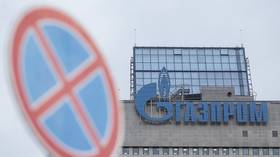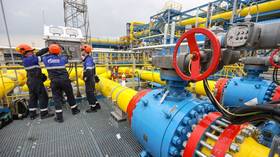EU timeline for ‘phasing out’ Russian energy disclosed
Western leaders are aware of the damage sanctions will inflict on their own economies, Germany admits
The year 2022 will see Western countries implementing “a very ambitious policy” of reducing dependence on energy from Russia, with Russian oil set to be phased out by the end of the year, German Chancellor Olaf Scholz has announced.
In an interview with Indian Express ahead of his meeting with India’s Prime Minister Narendra Modi in Berlin, Scholz explained that “the attack on Ukraine by Russia is on the top of the agenda for all of Europe and beyond.” He also expressed confidence that there is “broad agreement” between Germany and India that Russia’s actions violate the “core principles of the UN Charter,” that “massacres against the civilian population are war crimes,” and that “those responsible must be held accountable.”
In response to what he called a “massive and unacceptable breach of international law,” Scholz explained that many Western countries imposed sanctions on Russia, “even if this necessarily implies economic costs” for themselves.
India is among a number of major economies that have continued to trade with Moscow since the launch of its military offensive in Ukraine. Last month, New Delhi hosted European Commission President Ursula von der Leyen and UK Prime Minister Boris Johnson, who sought to sway officials towards taking part in the sanctions and scaling back economic and military ties with Moscow. However, India has so far refused to condemn Russia’s actions.
“We are furthermore now implementing a very ambitious policy to reduce our dependency on the import of fossil fuels from Russia. We will stop the import of Russian coal this summer, we will phase out Russian oil [by] the end of the year, and will reduce gas imports from Russia severely,” the chancellor said.
Scholz has been known for taking a cautious approach on the matter of Russian energy, as Germany depends on it more than many other EU countries. The chancellor has said that a ban on Russian gas would not stop the conflict in Ukraine, but would cause an economic crisis in Germany and the EU.
However, as the EU discusses its sixth package of sanctions against Russia, Germany has apparently begun to lean towards taking more drastic measures, possibly because it has managed to significantly cut its own dependence on direct imports of Russian oil. Energy Minister Robert Habeck revealed last week that Berlin previously sourced a third of its requirements from Russia, but has now cut that to just 12%.
“The problem that seemed very large for Germany only a few weeks ago has become much smaller. Germany has come very, very close to independence from Russian oil imports,” Habeck said.
Russia supplied about 25% of the EU’s total annual oil needs in 2020, and the bloc accounted for half of Russia’s exports of the fuel. Brussels reportedly intends to make up the difference by increasing imports from Nigeria, the Persian Gulf exporters, as well as Russia’s neighboring Azerbaijan and Kazakhstan.
Moscow is apparently skeptical about Europe’s chances of surviving without its energy. Former President Dmitry Medvedev, who is currently the deputy chairman of the Russian Security Council, wrote last month: “According to recent IMF data, Europe will be able to do without our gas for no more than 6 months. But speaking seriously, they won’t even last a week.”
In March, the Russian deputy prime minister and former energy minister, Alexander Novak, said the ban on Russian oil and gas imports could result in a crash of Europe’s energy market.
“It is absolutely obvious that without Russian hydrocarbons, if sanctions are imposed, the gas and oil markets will collapse. The rise in prices for energy resources can be unpredictable,” Novak said.
Russia sent its troops to Ukraine in late February, following Kiev’s failure to implement the terms of the Minsk agreements, first signed in 2014, and Moscow’s eventual recognition of the Donbass republics of Donetsk and Lugansk. The German and French brokered Minsk Protocol was designed to give the breakaway regions special status within the Ukrainian state.
The Kremlin has since demanded that Ukraine officially declare itself a neutral country that will never join NATO. Kiev insists the Russian offensive was completely unprovoked and has denied claims it was planning to retake the two republics by force.
Western countries responded to Russia’s “aggression” by imposing harsh sanctions on various sectors of the economy. Russia considers these actions unlawful and unjustified, and has been imposing its own counter-measures.







Comments are closed.